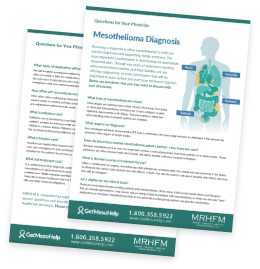Useful Information For Your Mesothelioma Diagnosis
How is Mesothelioma Diagnosed?
Mesothelioma specialists use a variety of tests to help diagnose mesothelioma. Diagnostic tests help them obtain an accurate picture of the cancer stage and location of the mesothelioma tumor. An accurate mesothelioma diagnosis can lead to more treatment options for the patient and, ultimately, a better chance for an improved prognosis. Types of Diagnostic Tests for Mesothelioma include image scans, biopsies, and blood tests.

Diagnostic Tests
Common diagnostic tests for mesothelioma include image scanning, which assists the doctor in finding the problem area.
- X-ray - An x-ray usually is the first diagnostic test a patient will encounter if their doctor believes their symptoms point to mesothelioma. It produces a two-dimensional scan of the affected area, showing tumors and buildups of fluid in the pleural or peritoneal cavities.
- CT Scan - A computed tomography (CT) scan provides doctors with three-dimensional scans of the affected area. Specialists often use a CT scan as a follow up to an x-ray. They can use these detailed images to find diseased tissue suitable for a biopsy.
- MRI Scan - A magnetic resonance imaging (MRI) scan produces high-resolution images of bones and body tissues. The MRI is different than a CT scan because it can differentiate body tissues and assign them colors. Chest MRIs help specialists determine if the mesothelioma has metastasized (spread) to the chest wall, diaphragm or other areas. Metastasis to these areas indicates an advanced stage of mesothelioma.
- PET Scan - A Positron Emission Tomography (PET) scan can show how active a tumor has been over time. Specialists use a special fluid they administer to the patient via IV to trace the cellular activity of a tumor. The fluid is attracted to cancer cells and helps doctors locate small tumors that may not have otherwise been picked up by other diagnostic scans.
- Echocardiogram - An echocardiogram uses sound waves to examine how well the heart is functioning. Patients with pericardial mesothelioma often experience chest pressure caused by a pericardial effusion, the buildup of fluid in the pericardium. Pressure from the pericardial effusion makes the heart work harder and beat irregularly. An echocardiogram can pick up on these symptoms and help diagnose pericardial mesothelioma.
Once an area of concern has been identified by image scanning, a doctor may request a biopsy of the tissue or a fluid sample from someone who potentially has mesothelioma. This procedure can be surgical or non-surgical for collecting the desired samples.
Surgical Biopsies
- Thoracoscopy – During this procedure, a surgeon makes a few small incisions in the patient's chest. Through these incisions, the surgeon inserts a camera and a device capable of retrieving a tissue sample from the pleural cavity.
- Thoracotomy – Surgeons make a large incision in the patient’s chest and take a direct sample from the chest cavity.
- Mediastinoscopy – Surgeons use a lighted camera attached to a small, thin tube to examine the area between the lungs (commonly called the mediastinum). Since lymph nodes are present in the mediastinum, a mediastinoscopy helps determine if a patient’s mesothelioma is at an advanced stage and has spread outside of the pleura.
- Laparotomy – The surgeon makes a cut into the abdomen while the patient is under general anesthesia. A direct sample of the mesothelioma is taken from the abdominal cavity for further testing.
- Laparoscopy – Less invasive than a laparotomy, a surgeon uses a camera to examine the abdominal cavity and collects tissue samples through small incisions in the abdomen.
Once an area of concern has been identified by image scanning, a doctor may request a biopsy of the tissue or a fluid sample from someone who potentially has mesothelioma. This procedure can be surgical or non-surgical for collecting the desired samples.
Non-surgical biopsies are beneficial to patients because they do not require surgery and are often out-patient procedures. The three types of non-surgical biopsies are:
- Thoracentesis – A needle is inserted into the chest cavity, from which fluid is drawn for testing.
- Paracentesis – The fluid is removed from the space between the inner and outer peritoneal linings.
- Pericardiocentesis –The fluid is removed from the pericardium, the lining of the heart.
People with mesothelioma have higher concentrations of certain proteins in their blood. Blood tests measure the level of proteins and other signs pointing to the presence of mesothelioma. They provide doctors with a picture of how far mesothelioma has spread. Mesothelioma patients typically exhibit higher concentrations of:
- Osteopontin (OPN) - Studies show that OPN plays a role in many biological processes, like the development of tumors.
- Cancer Antigen 125 (CA125) - Patients diagnosed with mesothelioma show higher amounts of CA125 in their blood.
- Fibulin-3 - Patients diagnosed with mesothelioma also show higher concentrations of Fibulin-3.
- MesoMark™ - MesoMark™ is a test that may accurately diagnose mesothelioma by measuring the amount of soluble mesothelin-related peptides (SMRP) in a patient’s blood. SMRPs are biomarkers, or signs, of mesothelioma.
Get Free Mesothelioma Resources & Support
Our advocate team is dedicated to helping you and your loved ones understand what mesothelioma is, what treatment options may be best for your specific situation, and what additional resources you may need. We feel strongly that anyone diagnosed with mesothelioma needs an advocate.
Complete the form below to start the conversation and receive your free mesothelioma resources.

